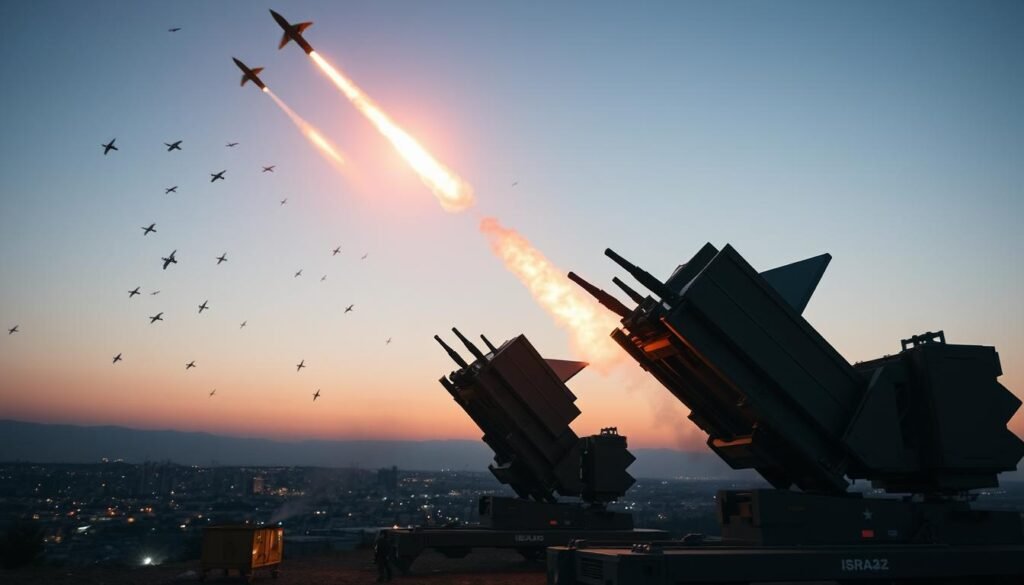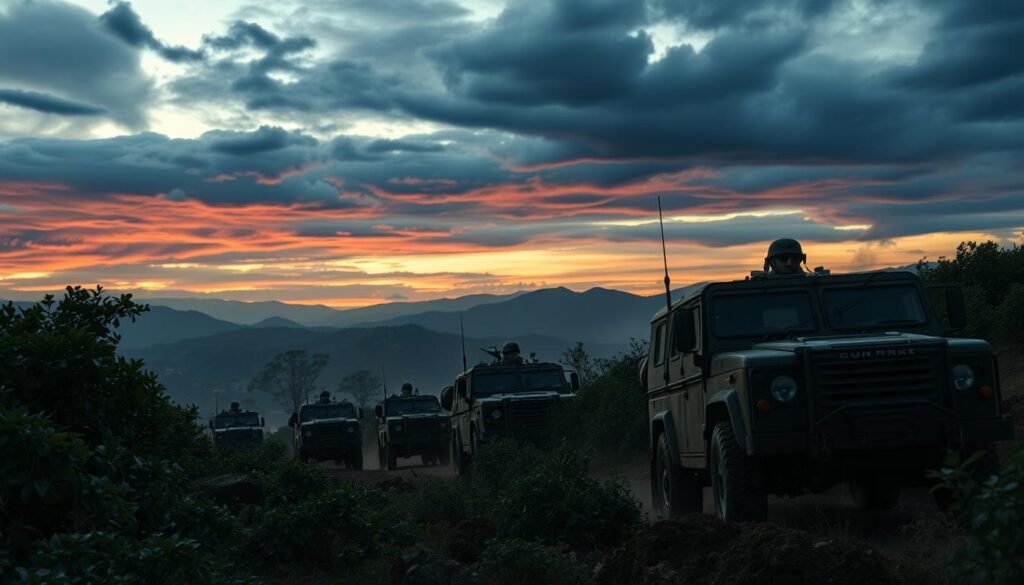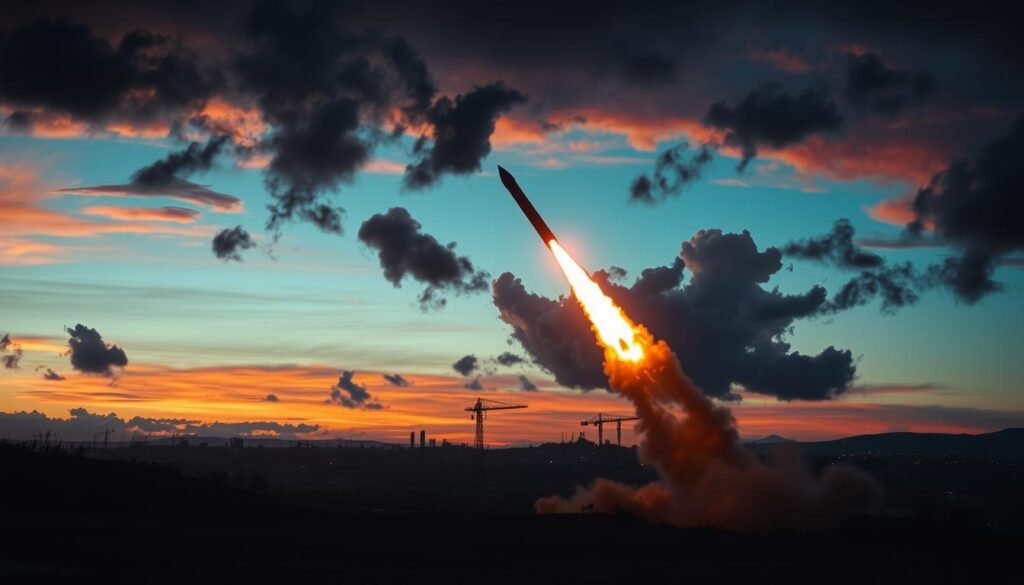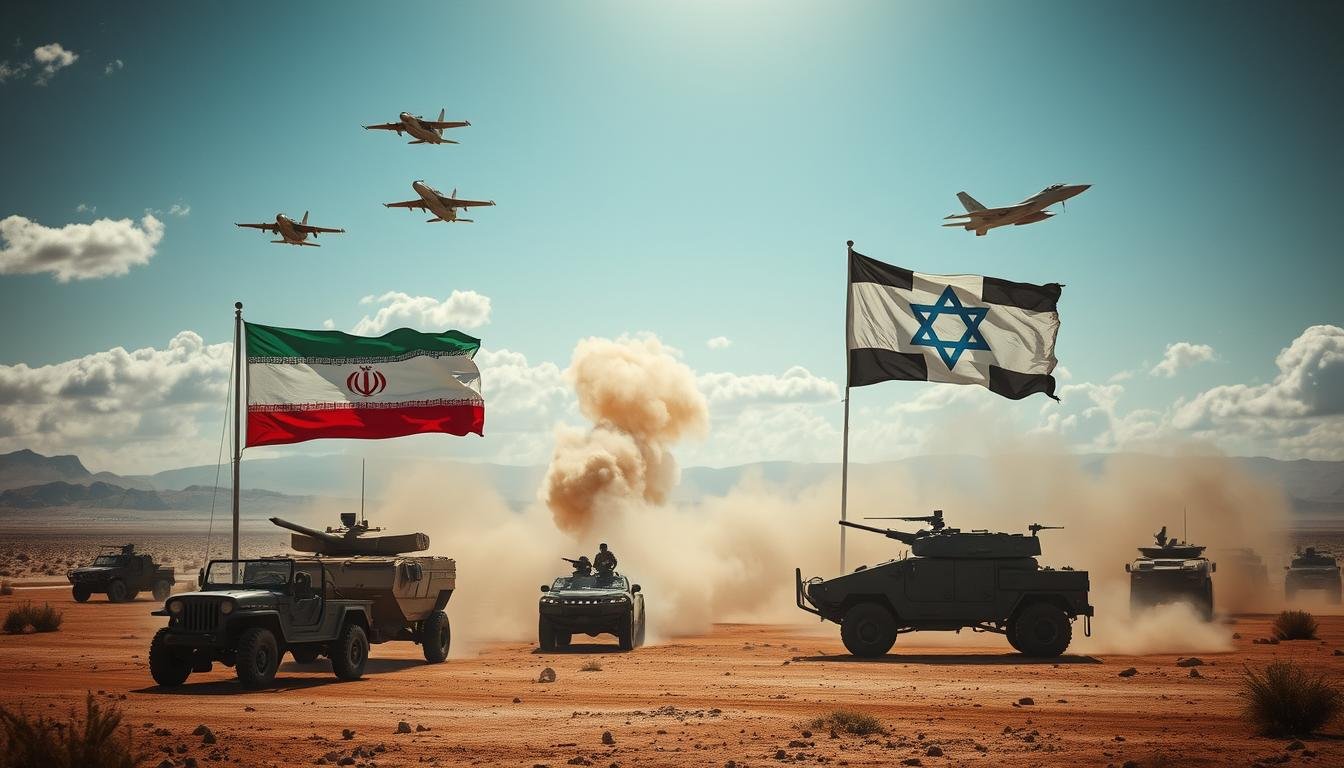The Middle East is on high alert. Prime Minister Benjamin Netanyahu has promised to hit back at Iran. This comes after Iran fired many ballistic missiles at Israel. Israel’s military is sending more troops to southern Lebanon, where fighting has started.
Israeli officials say most missiles were caught by air defenses. The U.S. and other allies helped. Netanyahu called Iran’s actions a big mistake and said they will pay for it.
Iran’s Revolutionary Guards Corps said the attack was for the killings of leaders of Hezbollah and Hamas. The day before, Israeli forces entered southern Lebanon. Israeli strikes killed 55 people and hurt over 150.
Key Takeaways
- Iran launched a massive ballistic missile strike on Israel, with around 180 missiles fired.
- Most of the missiles were intercepted by Israel’s air defenses, including the Iron Dome system.
- The attack was a retaliation by Iran for recent Israeli actions against its proxy groups in the region.
- Israel vowed a strong response, and has already begun a ground invasion of southern Lebanon.
- The situation in the Middle East is rapidly escalating, raising concerns about a wider regional conflict.
Iran Launches Massive Ballistic Missile Strike Against Israel
In a dramatic escalation, Iran has launched a massive ballistic missile attack against Israel. Reports say Iran fired over 180 missiles from its territory. These targeted various locations across Israel.
The missile barrage included Iran’s “Fattah-2” hypersonic missiles. Iran claimed these were to destroy Israel’s Arrow 2 and Arrow 3 defenses. Iran also launched Emad and Ghadr missiles in the strike.
Details on the Iranian Missile Barrage
Iran’s state media said the country fired 200 missiles towards Israel, including the Fattah-2. But, the U.S. Department of Defense confirmed many missiles were intercepted by Israel and a U.S.-led coalition.
Israeli Defense Forces (IDF) officials said most missiles were shot down. However, some caused limited damage. Iran’s military chief of staff warned of a more intense strike if Israel retaliates.
- Iran launched over 180 ballistic missiles from its territory towards Israel
- The missile barrage included Iran’s new hypersonic “Fattah-2” missiles, as well as Emad and Ghadr ballistic missiles
- U.S. forces assisted in the interception of the missiles, with the majority being shot down by Israel’s defense systems
- Iran threatened to escalate the attack if Israel retaliates, targeting the country’s infrastructure
The latest Iranian missile attack marks a significant escalation in tensions between Iran and Israel. The world waits with bated breath to see Israel’s response to this bold Iranian move.
Israel’s Air Defense Response and Casualties
When Iran launched a massive missile attack on Israel, the Israeli Defense Forces (IDF) and their allies quickly acted to protect the country. The IDF said they stopped most of the Iranian missiles. Their advanced Israel air defenses and Israel intercept missiles worked well.
IDF Spokesperson Rear Admiral Daniel Hagari said some missiles hit central and southern Israel. But, the IDF and the U.S.-led coalition stopped most of them. National Security Adviser Jake Sullivan called the Iranian attack “defeated and ineffective.”
A U.S. defense official said American destroyers in the eastern Mediterranean helped stop the missiles. The attack killed one Palestinian near Jericho and injured two Israelis in Tel Aviv.
The Israel iron dome was key in defending against the Iranian missiles. Despite the losses, the IDF’s quick action showed Israel’s air defenses are strong. They protect against such threats.

Israel Vows Retaliation Against Iran
Israeli Prime Minister Benjamin Netanyahu warned Iran, saying they “made a big mistake and will pay.” He made it clear that Israel will attack anyone who attacks them. The Israeli Defense Forces (IDF) Spokesperson, Daniel Hagari, also said Israel is ready to respond “wherever, whenever, and however we choose.”
Iran recently launched a ballistic missile attack on Israel. The IDF claims most of it was stopped by air defense systems, with help from the U.S. and allies. Israel has shown it’s ready to strike back, hitting an Artesh Air Force base in Esfahan, Iran, after a missile and drone attack on Israeli territory.
Netanyahu’s Warning to Iran
Prime Minister Netanyahu’s message to Iran was direct: “Iran made a big mistake and will pay.” He said Israel will defend itself, attacking anyone who attacks them. He also said Israel will choose the time and place for its attacks.
“We will attack anyone who attacks us, and we will attack in places and ways that we choose.” – Benjamin Netanyahu, Prime Minister of Israel
The IRGC, Iran’s elite military force, said it would attack Israel again if Israel strikes back. But Israel’s leaders are firm, with the IDF ready to act whenever and wherever needed.

The tensions between Israel and Iran are growing, raising fears of a bigger conflict. The world is watching closely, hoping both sides will find a peaceful solution. This is to prevent more violence and instability in the Middle East.
Ground Invasion of Southern Lebanon Commences
The conflict between Israel and Iran has grown worse. The Israeli Defense Forces (IDF) have now launched a ground invasion of southern Lebanon. This move follows weeks of rising tensions and missile attacks.
The IDF 98th Division, known for its battles in the Gaza Strip, has started a “focused activity” in southern Lebanon. The military calls it a “targeted and delimited” operation. A special operations brigade, a paratrooper brigade, and an armored brigade are leading this effort.
The Israeli security cabinet agreed to the “targeted ground entry” into southern Lebanon on September 30th. This marked the start of a new phase in the israel invasion lebanon and israel ground invasion lebanon conflict. It was a response to Iran’s israel lebanon, israel southern lebanon, and idf lebanon attacks, which saw over 180 missiles fired at Israeli targets.
The IDF aims to remove Hezbollah from the area and target Iranian military sites. This action is to secure Israel’s borders and protect its citizens from attacks.
“This ground operation is a necessary step to safeguard our country and our people. We will not hesitate to take decisive action against those who threaten our security.”
– Prime Minister Benjamin Netanyahu
The situation in southern Lebanon is still tense. Hezbollah has fired rockets towards central Israel, injuring one man. The conflict has forced hundreds of thousands of Lebanese civilians to flee. The European Union has called for an urgent UN Security Council meeting to address the crisis.

As the israel invasion lebanon and israel ground invasion lebanon operation goes on, the world watches closely. Everyone hopes for a quick end to the conflict and the safety of civilians.
Iran attack Israel
In a dramatic escalation, Iran launched a massive ballistic missile attack on Israel on October 1st. Reports say Iran fired about 180 missiles towards Israeli territory. This is a big jump from the 110 missiles fired in April.
The Iranian Islamic Revolutionary Guard Corps (IRGC) said 90% of the missiles hit their targets. Three Israeli military bases were hit. There was one casualty in the occupied West Bank and two people slightly wounded in Israel.
The U.S. Navy destroyers fired about a dozen interceptors against the Iranian missiles. The U.S. and UK forces supported Israel during the attacks. The UK’s Defence Secretary said British forces helped prevent further conflict.
The international community strongly reacted to the Iranian assault. The UK Prime Minister, along with France and Japan’s leaders, supported Israel’s right to defend itself. They also condemned Iran’s actions. Israel’s Prime Minister warned of consequences and plans for more military operations.
The situation is still tense. Iran’s IRGC hinted at a more severe response if Israel retaliates. This has raised concerns about further escalation and its impact on civilians in the area.
| Statistic | Details |
|---|---|
| Missile Quantity | Iran launched around 180 missiles towards Israel, a larger attack compared to April’s barrage containing about 110 ballistic missiles and 30 cruise missiles. |
| Missile Accuracy | Iranian Islamic Revolutionary Guard Corps (IRGC) claimed 90% of projectiles hit their targets, with three Israeli military bases targeted. |
| Casualties | The Palestinian civil defense authority reported one casualty during the Iranian missile barrage in the occupied West Bank, with another two people slightly wounded by shrapnel in Israel. |
| International Involvement | US Navy destroyers fired about a dozen interceptors against Iranian missiles heading to Israel, with US and UK forces involved in supporting Israel during the attacks. |
| International Reaction | The UK Prime Minister and leaders from France and Japan reiterated support for Israel’s right to self-defense and condemned Iran’s actions. |
| Potential Retaliation | Iran’s IRGC mentioned that Tehran’s response would be more severe if Israel retaliated. |

The latest Iranian missile assault on Israel has further escalated tensions in the region. This has raised concerns about a wider conflict. The international community is closely monitoring the situation and urging restraint to prevent a crisis from spiraling out of control.
Hezbollah’s Response and the Situation in Lebanon
The Israeli invasion of Lebanon is ongoing, and Hezbollah’s response is key. Hezbollah, based in Lebanon, has clashed with Israeli forces before. They are known for their strong rocket and missile arsenal.
Hezbollah has not yet directly fought the Israeli military in southern Lebanon. This might mean they are being careful. But, Israeli artillery units keep hitting border towns like Kafr Kila and Tal al Nahhas. The Israeli Air Force has also bombed, causing damage and deaths among Lebanese civilians.
Impact on Lebanese Civilians
The Israeli attacks on Lebanon have hurt the civilian population a lot. The Lebanese health ministry says 55 people have died and over 150 have been hurt. Many Lebanese civilians have had to leave their homes, seeking safety elsewhere.
| Statistic | Value |
|---|---|
| Number of Lebanese killed | 55 |
| Number of Lebanese wounded | Over 150 |
The conflict has made life hard for Lebanese civilians. They face displacement, food and water shortages, and lack of services. The impact on Lebanon is big, and its people are suffering because of the fight between Israel and Hezbollah.
“The people of Lebanon are facing immense suffering due to the ongoing conflict. We call on all parties to exercise restraint and prioritize the protection of civilian lives.”
International Reaction and Support for Israel
When Iran launched a massive ballistic missile strike against Israel, the world reacted. Some condemned Iran, while others supported Israel. Russia, despite its close ties with Iran, called for calm and condemned harm to civilians.
France, however, took action. It sent military help to Israel to fight off Iran’s missiles. France’s leader spoke out against the attack and asked Israel to stop its military actions in Lebanon. President Biden said the U.S. was backing Israel, with U.S. Navy ships helping to shoot down missiles.
| Country | Reaction |
|---|---|
| Russia | Called for “restraint,” condemned actions leading to civilian casualties |
| France | Mobilized military resources to assist Israel, condemned missile barrage, urged end to Israel’s Lebanon operations |
| United States | Actively supported Israel’s defense, with U.S. Navy destroyers joining in intercepting missiles |
The world’s reaction to the Iran-Israel conflict shows the complex alliances in the region. As the situation gets more tense, everyone is watching closely. They’re waiting to see how it affects peace and stability in the area.
Potential for Further Escalation and Regional Instability
The recent fight between Iran and Israel has raised big worries. Iran launched nearly 200 missiles at Israel, a huge step up in their fight. The U.S. and its friends helped Israel fight back, but the area is still very tense.
Now, Israel has invaded southern Lebanon. This move has made things worse with Hezbollah, a group backed by Iran. It could also make things harder for Lebanon’s different groups, leading to more fights.
Lebanon is already facing big problems, like economic issues and old fights. Israel’s past actions in Lebanon have made things harder for Israel. The current situation could make these problems even worse.
Risks of an Expanded Conflict
The situation is getting more serious. The fight between Iran and Israel, and the chance of more trouble in Lebanon, could make things unstable across the region. This could lead to many problems, like people being forced to leave their homes and important things being broken.
The article says we need to work together to stop things from getting worse. We need to talk, work together, and try to calm things down. This is the only way to avoid a big war in the area.
“The potential for further escalation and regional instability is a grave concern. The situation requires a measured and coordinated response from the international community to prevent a wider conflict from erupting.”
Analysis: Iran’s Strategic Objectives and Israel’s Response
The recent missile strike by Iran against Israel was a strategic move. Iran fired about 180 ballistic missiles on October 1. This is more than the 120 missiles they fired in April 2024. They aimed to overwhelm Israel’s air defense systems by targeting densely populated areas.
Iran invested a lot in this attack, showing it was not just a gesture. They wanted to cause significant damage to Israel. Prime Minister Netanyahu’s stern warning that “Iran made a big mistake and will pay” shows Israel’s readiness to respond.
Israel’s response was quick and strong. The Israel Defense Forces (IDF) intercepted most of the 180 missiles. They also launched a ground operation in southern Lebanon. This shows Israel is ready to fight back against Iran’s allies, like Hezbollah.
| Metric | Value |
|---|---|
| Iran’s Ballistic Missile Attack | 180 missiles (October 1) |
| Previous Iran Missile Attack | 120 missiles (April 2024) |
| IDF Missile Interception Rate | Majority of 180 missiles intercepted |
| Ground Operation in Southern Lebanon | Involvement of various military brigades |
| Israeli Casualties | 1 Palestinian killed, 2 Israelis injured |
The Iran-Israel conflict is changing, with both sides trying to gain an advantage. The world is watching closely, worried about more violence and instability.
Conclusion
The conflict between Iran and Israel has grown worse. Iran fired a huge number of ballistic missiles at Israel. This was in response to the death of key leaders in the Axis of Resistance.
This attack has made the situation even more tense. It has raised worries about more violence and instability in the area.
Israel has promised to hit back at Iran. They have already started a ground attack in southern Lebanon. The situation is very unstable, with both sides wanting to achieve their goals.
The world is urging both sides to calm down. The United States, France, and others are backing Israel.
The future of this Iran-Israel conflict is unclear. The Middle East is dealing with the fallout of these Middle East tensions. The impact on stability and the chance of a bigger conflict are being watched closely.
It’s clear that this crisis is far from over. Finding a way out will need careful diplomacy and efforts to reduce tensions.

2 thoughts on “Iran Attack Israel: Latest Updates and Analysis”